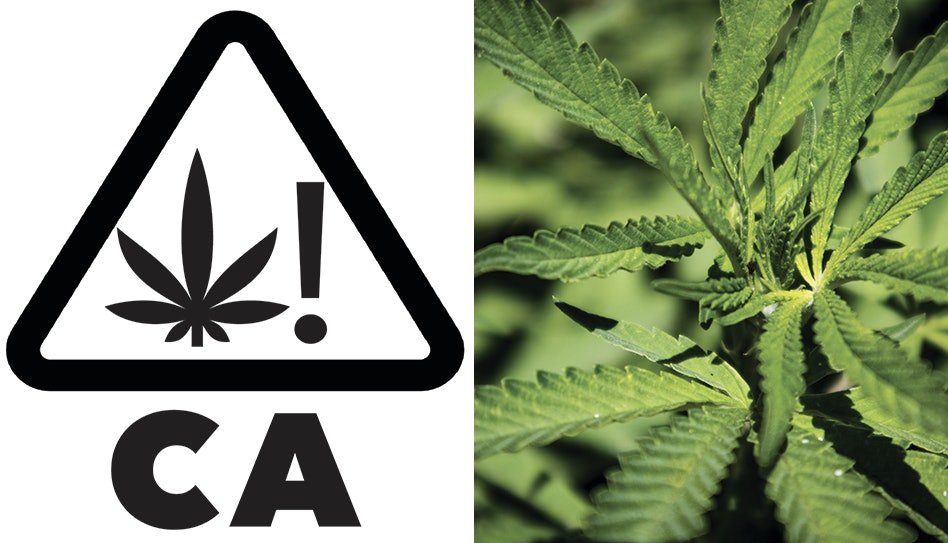featured
Companies Challenging Federal Marijuana Prohibition Seek Supreme Court Review, But Will Justices Take The Case?
Published
8 hours agoon

Late last month, a U.S. appeals court rejected the arguments of state-legal cannabis companies seeking to overturn the federal government’s longtime prohibition of marijuana, the latest blow to the high-profile lawsuit following a lower court’s dismissal of the claims.
But it’s hardly the end for the legal challenge, which since its filing in 2023 has aimed to reverse a more fundamental Supreme Court precedent. The question now is whether the high court will agree to hear the current case—Canna Provisions v. Bondi—and if they do, whether the industry challenge might succeed.
It’s widely understood that the plaintiffs’ legal team, led by the prestigious litigation firm Boies Schiller Flexner LLP, has long intended the matter to end up before the nine justices. And in a recent email to Marijuana Moment, attorney Jonathan Schiller all but confirmed that’s the next step.
“It’s fair to assume,” he said, “that we shall seek Supreme Court review.”
One sign that at least some on court might be interested in taking the appeal is a 2021 statement from Justice Clarence Thomas, issued as the court denied review of a separate dispute involving a Colorado medical marijuana dispensary.
In it, Thomas discussed a landmark 2005 Supreme Court ruling, Gonzales v. Raich, wherein justices narrowly determined that the federal government could enforce prohibition against cannabis cultivation that took place wholly within California based on Congress’s authority to regulate interstate commerce.
It may be time, Thomas’s comments seemed to suggest, to revisit Raich—a move that could largely upend federal prohibition.
The statement pointed to policy developments since the earlier case was decided, such as the hands-off enforcement approach taken by the Department of Justice as more states legalized cannabis and a congressional budget rider protecting state-legal medical marijuana programs.
“Whatever the merits of Raich when it was decided, federal policies of the past 16 years have greatly undermined its reasoning,” Thomas wrote, describing the government’s approach to cannabis enforcement as “a half-in, half-out regime that simultaneously tolerates and forbids local use of marijuana.”
“Though federal law still flatly forbids the intrastate possession, cultivation, or distribution of marijuana…the Government, post-Raich, has sent mixed signals on its views,” the justice continued, saying the situation “strains basic principles of federalism and conceals traps for the unwary.”
“One can certainly understand why an ordinary person might think that the Federal Government has retreated from its once-absolute ban on marijuana,” he wrote, suggesting that a “prohibition on intrastate use or cultivation of marijuana may no longer be necessary or proper to support the Federal Government’s piecemeal approach.”
The question of whether the U.S. government has authority to forbid within-state cannabis activity as an extension of its power to regulate interstate commerce also sits at the center of the current case. As such, some experts feel the court is likely to accept plaintiffs’ request and seize on the opportunity to return to Raich in the current era.
Erik Luna, a constitutional and criminal law professor at Arizona State University (ASU), said he thinks plaintiffs—multi-state operator Verano Holdings Corp. and the Massachusetts-based cannabis businesses Canna Provisions and Wiseacre Farm, along with Treevit CEO Gyasi Sellers—are the “the exact ones” needed to demonstrate that Raich was wrongly decided.
They’re entities that are affected by federal prohibition “and are part of a regulated, controlled intrastate scheme,” he said.
“The reason the plaintiffs were picked is precisely because of the Standing Akimbo case,” the professor noted, referring to the Colorado dispensary dispute that prompted Thomas’s 2023 comments, “to demonstrate that, in fact, the things that were of great concern to Justice Thomas—they are in play in the Massachusetts team.”
Luna, whom Marijuana Moment was referred to through the plaintiffs’ legal team, pointed out that Thomas is the senior justice on the Supreme Court and the only sitting justice who was present when Raich was initially decided.
“Many people call it the Roberts Court, just as they called it, before, the Rehnquist Court, etc.,” he said, referring to Chief Justice John Roberts. “But it’s the Thomas Court, right?”
“If it is the Thomas Court, in a sense,” Luna continued, “then I would not be surprised if Justice Thomas would see a federalism case or a structure-of-government case like this as the precise mechanism by which he can show the vindication of individual rights by means of federalism and structural constraints under the Constitution.”
But other observers are more skeptical the high court will hear the case.
“I think they likelihood that they’ll take it is extremely low,” said Robert Mikos, a Vanderbilt University law professor who specializes in federalism and drug law.
“This isn’t Raich,” he told Marijuana Moment. “This is a world apart from Raich. You’ve got companies that are selling marijuana for profit. This is commerce. If you want a vehicle for overturning Raich, this isn’t it. Raich was just very different.”
Mikos and others noted that Raich centered on noncommercial cannabis activity, specifically whether the federal government could criminalize homegrown medical marijuana in California, where the drug was legal. That could distinguish it from the current challenge.
“If this was a case brought by some individual who said, ‘I just want to be allowed to grow this stuff for my own use in my backyard,’ you might get the Supreme Court divided,” Mikos said, “because that’s closer to Raich.”
The Villanova professor said justices “would need to take a really extreme, long-outdated view of the Commerce Clause to come out differently in this case.”
“There was a brief period of time where the Supreme Court disastrously said that the federal government couldn’t regulate even commerce that was entirely confined within a state,” he acknowledged, “but the Supreme Court rightfully jettisoned that view around the time of the New Deal. So you’d have to roll back the clock and do something that would have really far-reaching ramifications.”
Another professor, Douglas Berman, executive director of the Drug Enforcement and Policy Center at Ohio State University’s Moritz College of Law, also doubted the case’s chances of winning Supreme Court review, calling them “slim to none.”
“I throw in ‘slim’ only because I don’t want to be absolutely wrong,” he said. “You never about this stuff, but I have a hard time thinking how you get to four votes for cert.”
Once plaintiffs file their forthcoming petition for a writ of certiorari, it would need needs the votes of four justices to put the case before the Supreme Court.
Berman told Marijuana Moment that he sees the Canna Provisions case as “not a bad strategic choice” by the industry but also said he’s “long sensed that there were opportunities, given the uniqueness of marijuana policy in the country, to try to pioneer some new arguments” outside the case’s Commerce Clause claims.
“The combination of the commerce piece and the risk of dramatically restricting federal power writ large will make the more liberal justices very disinterested in taking the case,” he predicted.
On Raich‘s way to the Supreme Court, Berman noted, there were separate claims under the Ninth and 10th Amendments that fell out of the briefings as the case proceeded. “Why not also develop arguments under other constitutional theories?” he asked.
The legal team’s certiorari petition in Canna Provisions v. Bondi has yet to be seen, meaning it’s possible plaintiffs will develop additional arguments to bolster their case. Other parties may also file friend-of-the-court briefs with further comments about whether justices should review the matter.
Luna, at ASU, who has higher expectations for the challenge, said he wouldn’t be surprised if the current Supreme Court is ultimately open to reconsidering nearly a century of precedent and more severely limiting the federal government’s power over intrastate commerce.
He pointed out that the Raich ruling itself stems from a 1942 Supreme Court decision, Wickart v. Filburn, which said the federal government could regulate the personal cultivation and consumption of crops due to the aggregate effect of the activity on interstate commercial markets.
“To get down to the nitty gritty, it really is a choice about how much power—given the text, context and history of our constitutional order—we want to vest in the federal government?” Luna asked.
The current political and legal climate in the country has changed in recent years, he added, which also complicates the calculus over what cases the high court will hear.
“We’re in a new world order right now. Things have changed within the past six months, seven months, eight months,” he said. “The notion that the traditional rules about what cases the Supreme Court hears will necessarily hold going forward, I’m not so sure that’s true.”
Even skeptics acknowledged that the drastically different makeup of the high court since Raich was decided two decades ago makes the matter a more open question. They said recent decisions around issues like abortion, gun rights and presidential authority demonstrate justices’ willingness to reconsider longstanding precedent.
Tim Swain, a Massachusetts-based partner at the cannabis-focused law firm Vicente LLP, said he’s personally thinks there’s a “pretty decent chance” the Supreme Court will deny review, but he admitted it would be hard to tell a client what to expect in the case given how much turnover there’s been on the bench since Raich.
“You’re always going to be asked by the client, ‘What is the chance of success?’” he said. “In this case, if you’re being honest with them, you’re going to say, ‘It’s hard to predict.’”
Regarding the Canna Provisions case, he said, the court would have to “essentially have to ignore the commercial nature of the activity” in order to rule for the plaintiffs, “which I think is not really going to be possible.”
“It appeals on the surface, like this should be something that such a conservative court would want to take on,” he told Marijuana Moment. “But it doesn’t have the facts that are going to allow them to get where they want the law to go.”
Like other skeptics, Swain said a noncommercial plaintiff might have a better chance at winning review.
“If they were bringing this case on behalf of a medical-only operator, I think there would be a greater chance that this case would get cert,” he said, “but that’s not where the market is.”
“What everyone wants out of this case is a decision by the Supreme Court that the [federal Controlled Substances Act] doesn’t apply to any plant-touching company complying with state law,” the attorney explained. “That would be phenomenal for the industry on so many different levels. It wouldn’t be nearly as important or worth the effort if that decision were limited to the medical space.”
Two other reasons the court may be hesitant to take the case, experts said, are the ongoing federal rescheduling review of marijuana—which is currently stalled amid a separate legal dispute—as well as the lack of any split among federal appellate courts on the commerce clause issue.
Despite what he thinks are the case’s long odds, Swain was deferential to attorneys in the case, saying that “they’ve gone about it, for what their client wants, in the best possible way that they can.”
He also noted that for the businesses, there’s little on the line except money. While a victory before the Supreme Court would be a massive win for plaintiffs, a loss in the case might still be bearable: Whether the recent First Circuit opinion stands or the Supreme Court denies the challenge, the current legal landscape would remain unchanged.
“The only risk here is the money that it costs to bring this case,” Swain said.
He predicted that at least part of the incentive for plaintiffs to bring the current challenge was a feeling that cannabis reform at the federal level had slowed, whether on tax issues, banking or legalization more broadly.
“You’re frequently dealing with clients that come to you, they’re fed up with the circumstances…the fees, the taxes, the whole system,” he said. “They just want something done.”
Plaintiffs in the case either did not respond to direct requests for comment from Marijuana Moment or referred questions to a public relations team for the group. Lawyers for the companies did not comment other than to confirm the likelihood of their forthcoming appeal effort.
David Boies, chairman of Boies Schiller, has a long list of prior clients that includes the Justice Department, former Vice President Al Gore and the plaintiffs in a case that led to the invalidation of California’s ban on same-sex marriage, among others.
Luna said he had confidence in the attorneys: “In many ways this is reading the tea leaves, but I wouldn’t bet against David Boies’s legal team.”
In the First Circuit’s upholding of a lower court’s dismissal of the case, Chief Judge David Barron that the plaintiffs’ “reasoning would mean that there would be a fundamental right to grow and sell any product that founding era laws encouraged residents of that time to grow and sell”
“We decline to adopt a line of reasoning that would support” that conclusion, he wrote.
The initial complaint, filed in U.S. District Court for the District of Massachusetts, argued that government’s ongoing prohibition on marijuana under the Controlled Substances Act (CSA) was unconstitutional because Congress in recent decades had “dropped any assumption that federal control of state-regulated marijuana is necessary.”
At oral argument on appeal late last year, Boies told judges that under the Constitution, Congress can only regulate commercial activity within a state—in this case, around marijuana—if the failure to regulate that in-state activity “would substantially interfere [with] or undermine legitimate congressional regulation of interstate commerce.”
Judges, however, said they were “unpersuaded,” ruling in last month’s opinion that “the CSA remains fully intact as to the regulation of the commercial activity involving marijuana for non-medical purposes, which is the activity in which the appellants, by their own account, are engaged.”
The district court, meanwhile, said in the case that while the there are “persuasive reasons for a reexamination” of the current scheduling of cannabis, its hands were effectively tied by past U.S. Supreme Court precedent in Raich.
Separately at the federal level, a pending Biden-era recommendation to reschedule marijuana to the less restrictive Schedule III of the CSA is remains stalled. Earlier this week, a key GOP-led House committee asked for a review of the rescheduling recommendation, expressing concerns about “deviations” from a prior review process as well as the “mental health hazards of regular use of high-potency marijuana.”
Last month, former President Joe Biden’s drug czar said rescheduling process may have been compromised officials within the Drug Enforcement Administration (DEA), which was supposed to be defending the proposed policy change. And a former Republican congressman raised questions about the sincerity of the President Donald Trump’s endorsement of rescheduling on the campaign trail.
What happens next in the process is uncertain, especially ahead of the potential Senate confirmation of Trump’s pick to lead DEA, Terrance Cole, who has declined to say whether he supports the proposal but has previously voiced concerns about the dangers of marijuana and linked its use to higher suicide risk among youth.
Trump, for his part, has not publicly weighed in on cannabis reform since taking office, and the White House did not include rescheduling in a recently released list of drug policy priorities for the administration.
Former DEA and Department of Health and Human Services officials have separately expressed their views that, if rescheduling is going to happen, the president will need to proactively demand its completion.
DEA recently notified an agency judge that the proceedings are still on hold—with no future actions currently scheduled as the matter sits before the acting administrator.
Photo elements courtesy of rawpixel and Philip Steffan.

Author: mscannabiz.com
MScannaBIZ for all you Mississippi Cannabis News and Information.
You may like
-


Missouri Cannabis Stakeholders Prepare 2026 Ballot Initiative To Create ‘Unified’ Marijuana And Hemp Regulations
-


California Public Health Department Aims to Make Hemp THC Ban Permanent
-


Texas Gov. Signs Bill Containing $100M for Psychedelic Research
-


Snoop Dogg Expands His Cannabis Brand Again, With New THCA Hemp Product Sales Website
-


The Best Jokes For Your Monday
-


Sunset Social Club Opens Hollywood’s 1st Luxury Cannabis Lounge
featured
Missouri Cannabis Stakeholders Prepare 2026 Ballot Initiative To Create ‘Unified’ Marijuana And Hemp Regulations
Published
30 minutes agoon
June 16, 2025
Missouri cannabis activists and industry stakeholders are gearing up for a push to put an initiative on the state’s 2026 ballot that’s meant to consolidate regulations and create parity between the hemp and marijuana sectors.
The marijuana legalization law that voters approved in 2022 enshrined regulations in the state Constitution, removing lawmakers’ ability to make certain adjustments. The industry coalition behind the forthcoming initiative is aiming to strike much of that language and instead give a constitutional mandate for the legislature to develop statutory rules themselves.
“In our American tradition, the purpose of a constitution is to define and restrain the power of governments—not the private sector or the individual,” Eapen Thampy, a lobbyist for American Shaman, told Marijuana Moment on Monday. “It’s the job of statutory law to handle regulation of the private sector.”
“I think this solves a lot of issues for a lot of people,” he said. “The marijuana guys have this insane regulatory burden created by regulations that they can’t change, despite the millions of dollars they spent supporting campaigns for office in the last election cycle.”
The text of the proposal is currently being drafted by an unnamed law firm, Thampy said during a virtual briefing with stakeholders and advocates on Monday. The plan is to get the measure filed by August to make the November 2026 ballot.
The effort is being organized under a new political committee called Missourians for a Single Market, which was formed this monrh.
In theory, the initiative would create a more leveled playing field for the marijuana and hemp industries, which currently abide by a discordant set of regulations. What stakeholders want to see is both industries treated more equitably, with policies that more closely resemble how the state deals with the alcohol and tobacco markets.
“We’ve got this artificial legal construct called ‘marijuana’ and this artificial legal construct called ‘hemp,’ and these two legal creations represent one plant,” Thampy said. “And so the idea here is, it’s one plant. There should be one unified market. There should be one unified set of regulations.”
“We have an opportunity in Missouri to pioneer a first-in-the-nation approach,” he said.
Steve DeAngelo, a well-known marijuana advocate and entrepreneur who has been involved in multiple successful legalization campaigns in the past and founded the Harborside dispensary in Oakland, California, also joined Monday’s video conference and voiced his support for the proposal.
He described the three “pillars” of the industry that he feels should be unified under a single regulatory model: marijuana, hemp and “legacy” operators that were in the space before legalization.
“When you bring down the barriers to entry, all of the legacy folks who are right now out of the legal system would be able to come in,” he said. “So you create one single, unified market for cannabis across all sectors. That’s the proposal that I have to advance now.”
—
Marijuana Moment is tracking hundreds of cannabis, psychedelics and drug policy bills in state legislatures and Congress this year. Patreon supporters pledging at least $25/month get access to our interactive maps, charts and hearing calendar so they don’t miss any developments.![]()
Learn more about our marijuana bill tracker and become a supporter on Patreon to get access.
—
Meanwhile, Missouri’s hemp market has been facing increased pressure from the state as officials attempt to crack down on businesses selling intoxicating cannabis products such as THCA outside of the marijuana program. Missouri Attorney General Andrew Bailey (R) sent over a dozen cease-and-desist orders to such businesses this month, threatening potential legal action for non-compliant businesses.
Lawmakers are contemplating multiple approaches, with different details on what kinds of products would be allowed and what limits would be set on THC levels in the products.
In February, legislation allowing low-dose intoxicating hemp beverages to continue to be sold in grocery and liquor stores was reported favorably by committees in both the House and Senate but was not enacted into law.
D.C. Hemp Company Sues Feds Over ‘Unworkable Standard’ Created By Marijuana Budget Rider
Photo courtesy of Philip Steffan.

Author: mscannabiz.com
MScannaBIZ for all you Mississippi Cannabis News and Information.
featured
California Public Health Department Aims to Make Hemp THC Ban Permanent
Published
2 hours agoon
June 16, 2025
The California Department of Public Health (CDPH) issued a proposal on June 13 to permanently ban hemp-derived intoxicating cannabinoid products, including those with trace amounts of THC.
The CDPH estimates that the proposal would cause 115 businesses to close and 18,478 jobs to be lost in five years after implementation, with $3.14 billion in lost revenue.
“Impacts on revenue affect the ability of businesses to remain financially stable and economically viable, and to have sufficient monthly cash flow to cover overhead and operating costs,” according to the CDTFA’s 22-page notice of proposed rulemaking. “These impacts disproportionately affect small businesses.”
Under the CDPH’s current regulations, which Gov. Gavin Newsom issued emergency rules for in September 2024, industrial hemp food, beverages and dietary supplements intended for human consumption must have no detectable THC or any “comparable cannabinoid” per serving, have a minimum purchase age of 21 and have no more than five servings per package.
These emergency rules collide with the 2018 Farm Bill’s federal definition of hemp, which can contain up to 0.3% delta-9 THC on a dry-weight basis during a pre-harvest field test. However, the federal legislation allows states to enact more stringent regulations surrounding their hemp programs.
While the emergency regulations are set to expire on Sept. 23, 2025, the CDPH’s latest proposal to permanently ban intoxicating hemp products with detectable amounts of THC is now under a 45-day rulemaking period, after which the department will consider all public comments, objections and recommendations. The CDPH scheduled a public hearing at 10 a.m. July 28.
Despite the adverse economic impacts, the department’s proposed regulations would “protect public health and safety by protecting consumers, especially youth under 21 years of age, and reducing risk of illness, injury or death,” according to the CDPH’s June 13 notice.
That sentiment mimics comments Newsom made in September, when he said his administration was taking action to close loopholes and increase enforcement to prevent children from accessing dangerous and unregulated products.
“We will not sit on our hands as drug peddlers target our children with dangerous and unregulated hemp products containing THC at our retail stores,” the governor said.
While children under 21 with certain health conditions would still have access to California’s medical cannabis program, they would no longer have access to hemp CBD products. The CDPH projects that only a “small number” of nonintoxicating CBD products would likely remain outside of the licensed cannabis market under the department’s proposal.
To comply with the proposed regulations (and the current emergency regulations), hemp product manufacturers would need to use a purified CBD isolate that eliminates traces of total THC.
“CBD isolate and other cannabinoid isolates that contain no detectable total THC are costly,” according to the CDPH’s notice. “It is estimated that there were not any preexisting hemp products in the California market, prior to the emergency regulations, that would have reliably complied with the no-detectable-total-THC standard. Many products previously available that were marketed as ‘CBD’ had very low levels of total THC but would still have been noncompliant with the proposed regulations due to trace amounts of total THC that would still be detectable at some level.”
The department projects roughly 100 of the state’s 115 licensed hemp manufacturers would be eliminated from the marketplace. Of the 15 CDPH-licensed manufacturers remaining in the market, approximately 10 would be expected to incur relabeling costs at an average of $20,000 per business. In total, about 50 businesses would incur those relabeling costs.
Before the emergency regulations took effect in September, intoxicating hemp products were sold at vape shops, gas stations and convenience stores statewide with no rules in place for age gating or marketing to youth shoppers. According to the CDPH, some hemp manufacturers marketed products to children with graphics and labeling that mimicked brands of popular candies and snacks.
Less than eight months after the emergency rules were in place, Newsom announced in May that 99.7% of state-licensed alcohol establishments were in compliance; however, the governor’s administration did not report compliance rates for unlicensed retail businesses. The projected enforcement compliance cost under the CFPH proposal is $785,000 per year.
The CDPH considered alternatives that would lessen any adverse economic impact on businesses and invited the public to submit proposals by email ([email protected]), fax (916-636-6220) or postal service (California Department of Public Health, Office of Regulations, 1415 L Street, Suite 500, Sacramento, CA 95814).
The CDPH estimates that the most impacted business type under the proposal would be carry-out retailers, which would experience a $2.02 billion revenue decrease in the first five years, while manufacturers ($615 million), food service retailers ($268 million) and wholesalers ($227 million) would also be impacted.
The department also anticipates that many of California’s roughly 70,000 residents who regularly consumer hemp products will likely substitute their in-state purchases with mail orders from out of state. This will impact California businesses’ ability to compete with other states.
“All the businesses affected will experience a decrease in competitiveness, and manufacturing and processing of hemp products will move out of state,” according to the CDPH’s notice. “Out-of-state businesses and the illegal market will supply the California THC hemp market.”
Under the rulemaking process, the department must determine that “no reasonable alternative” that it considered or was brought to its attention would more effectively carry out the purpose of the proposal: to protect the public health and safety.

Author: mscannabiz.com
MScannaBIZ for all you Mississippi Cannabis News and Information.
featured
Texas Gov. Signs Bill Containing $100M for Psychedelic Research
Published
3 hours agoon
June 16, 2025
While the hemp industry anxiously awaits Texas Gov. Greg Abbott’s (R) decision on pending legislation to ban hemp product sales in the state, the governor signed another bill to dedicate up to $100 million for researching the medical benefits of ibogaine, a naturally occurring psychedelic, the San Antonio Current reports.
Senate Bill 2308, signed into law last week by Abbott, allocates $50 million from taxpayers toward ibogaine research, designating that the other $50 million would come from the private sector. In return for its investment, the state will retain a 20% stake in medications developed in resulting clinical trials, the report said.
Preliminary research has found that ibogaine could be an effective treatment for anxiety, depression, and PTSD.
“Texas will now lead the way in America for the evaluation of ibogaine as a potential medication that can help improve the lives of so many veterans.” — Abbott, in a statement
Meanwhile, Senate Bill 3 — the hemp ban proposal currently pending on the governor’s desk — has proven to be unpopular even among Republican voters, according to a recent poll. Hemp advocates say the ban would throw the state’s $10 billion hemp industry into chaos and put over 50,000 jobs at risk. Hemp supporters say they have submitted thousands of hand-written notes and over 180,000 petition signatures calling on the governor to veto SB 3.
The governor has not yet indicated whether he intends to sign the hemp ban into law but has until July 22 to decide.
Lawmakers also passed legislation this year to expand the state’s medical cannabis program, adding dispensaries to the program and expanding the state’s qualifying conditions list to include chronic pain, traumatic brain injuries, and other conditions. The governor has also not signaled one way or another whether he supports the proposal.
Get daily cannabis business news updates. Subscribe
Have an additional perspective to share? Send us a message to let us know, and if your comment is chosen by our editors it could be featured here.
Perspective to add? Suggest a revision or submit commentary for review using the form below.
Ganjapreneur is made possible by our partners:

Author: mscannabiz.com
MScannaBIZ for all you Mississippi Cannabis News and Information.

Missouri Cannabis Stakeholders Prepare 2026 Ballot Initiative To Create ‘Unified’ Marijuana And Hemp Regulations

California Public Health Department Aims to Make Hemp THC Ban Permanent

Texas Gov. Signs Bill Containing $100M for Psychedelic Research

Snoop Dogg Expands His Cannabis Brand Again, With New THCA Hemp Product Sales Website

The Best Jokes For Your Monday

Sunset Social Club Opens Hollywood’s 1st Luxury Cannabis Lounge

California Moves to Permanently Ban Hemp THC Products

Companies Challenging Federal Marijuana Prohibition Seek Supreme Court Review, But Will Justices Take The Case?

Bill on Trump’s desk could ease cannabis research, congressman says (Newsletter: June 16, 2025)

Alabama Judge Will Hear Lawsuit From Parents Over State’s Medical Marijuana Delays

State, federal cannabis changes threaten Ohio festival’s future

US Senator, Congresswoman Call on Trump to End ‘Costly Marijuana Arrests’

Ohio Lawmakers Must Close Hemp Loophole And Limit Intoxicating Products To Marijuana Dispensaries (Op-Ed)

Teacher sued for allegedly giving Denver middle school students marijuana brownies

Teacher accused of giving Denver middle school students cannabis brownies

Perry Police arrest woman for allowing her child to eat cannabis brownie

Delaware Bill Would Limit THC Beverage Sales To Liquor Stores, Closing Out Existing Hemp Retailers

Former Texas Governor And Trump Cabinet Member Played Key Role In Making The State A Psychedelic Research Leader

Marijuana decriminalization Easton | Video

Teacher sued for allegedly giving Denver middle school students marijuana brownies

West Carrollton extends marijuana moratorium

Nabis Cannabis Distribution Warehouse opens in Rochester

Nabis Cannabis Distribution Warehouse opens in Rochester

Elizabeth Warren Pushes Trump To End Federal Marijuana Criminalization After Elon Musk’s ‘Failures’ To Stop Wasteful Spending With DOGE

Alert: Department of Cannabis Control updates data dashboards with full data for 2023

Connecticut Appoints The US’s First Cannabis Ombudsperson – Yes there is a pun in there and I’m Sure Erin Kirk Is Going To Hear It More Than Once!

5 best CBD creams of 2024 by Leafly

Free delta-9 gummies from Bay Smokes

EU initiative begins bid to open access to psychedelic therapies
New Study Analyzes the Effects of THCV, CBD on Weight Loss

Mississippi city official pleads guilty to selling fake CBD products

May 2024 Leafly HighLight: Pink Runtz strain

Curaleaf Start Process Of Getting Their Claws Into The UK’s National Health System – With Former MP (Resigned Today 30/5/24) As The Front Man

Horn Lake denies cannabis dispensary request to allow sale of drug paraphernalia and Sunday sales | News

5 best autoflower seed banks of 2024 by Leafly

Discover New York’s dankest cannabis brands [September 2024]

Press Release: CANNRA Calls for Farm Bill to Clarify Existing State Authority to Regulate Hemp Products

Local medical cannabis dispensary reacts to MSDH pulling Rapid Analytics License – WLBT

Nevada CCB to Accept Applications for Cannabis Establishments in White Pine County – “Only one cultivation and one production license will be awarded in White Pine County”

The Daily Hit: October 2, 2024

6 best CBD gummies of 2024 by Leafly

5 best THC drinks of 2024 by Leafly

5 best delta-9 THC gummies of 2024 by Leafly

Weekly Update: Monday, May 13, 2024 including, New Guide for Renewals & May Board meeting application deadline

People In This State Googled ‘Medical Marijuana’ The Most, Study Shows

PRESS RELEASE : Justice Department Submits Proposed Regulation to Reschedule Marijuana

Press Release: May 9, STIIIZY and Healing Urban Barrios hosted an Expungement Clinic & Second Chance Resource Fair

Thailand: Pro-cannabis advocates rally ahead of the government’s plan to recriminalize the plant
Trending
-

 California Cannabis Updates1 year ago
California Cannabis Updates1 year agoAlert: Department of Cannabis Control updates data dashboards with full data for 2023
-

 Breaking News1 year ago
Breaking News1 year agoConnecticut Appoints The US’s First Cannabis Ombudsperson – Yes there is a pun in there and I’m Sure Erin Kirk Is Going To Hear It More Than Once!
-

 best list11 months ago
best list11 months ago5 best CBD creams of 2024 by Leafly
-

 Bay Smokes12 months ago
Bay Smokes12 months agoFree delta-9 gummies from Bay Smokes
-

 Business9 months ago
Business9 months agoEU initiative begins bid to open access to psychedelic therapies
-

 cbd1 year ago
cbd1 year agoNew Study Analyzes the Effects of THCV, CBD on Weight Loss
-

 Mississippi Cannabis News1 year ago
Mississippi Cannabis News1 year agoMississippi city official pleads guilty to selling fake CBD products
-

 California1 year ago
California1 year agoMay 2024 Leafly HighLight: Pink Runtz strain



